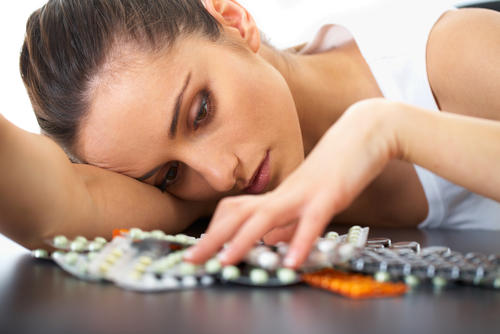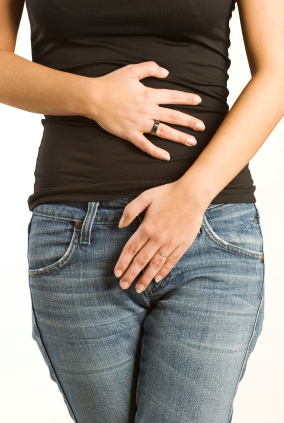Women's Health expert, Prof John Studd is concerned that many women suffering from depression seek advice from Psychiatrists only to be prescribed antidepressant drugs. When the depression does not respond to these drugs, the next psychiatric step is to issue a diagnosis of Bipolar Disorder. This, John Studd says is a disaster, because she will then be assaulted with a raft of chemicals that will impact on personality and destroy her libido.

The Wrong Treatment for Depression does not Help
Prof Studd says, "Cyclical depression which has failed to respond to repeated psychiatric interventions will often be incorrectly labeled Bipolar Disorder. Now she is in real trouble with a new batch of personality and libido destroying drugs that will be prescribed for her as well as hospital admission for what should be an easily treatable condition."
Links between Libido and Depression
Libido and depression are closely linked as they are interrelated by changes in hormones levels. Prof Studd therefore explains the need to ask some very personal questions concerning libido, partner orgasms and solo orgasms. He says, "These questions are normally asked and answered without any embarrassment from either side as they appear relevant to the presenting problems and women are pleased to have a reason to discuss such private matters with a neutral practitioner."
I have no interest in men unless they play rugger or sing at the opera
Prof Studd explains how he believes the libido to be a barometer of how well people feel. "By “people” in this context I mean of course women. I have no interest in men unless they play rugby or sing at the opera. Libido is a measure of the physical, emotional, hormonal and relationship characteristics of the woman."
Of course, there may be other non-hormonal reasons for a lack of libido. A healthy libido is also influenced by matters of both the heart and the head. Prof Studd says, "If the woman does not like her partner because of his behavior or lack of attention/attraction that is a problem of the Heart that doctors cannot sort out. Similarly if the Head is cautious because of the woman’s background and beliefs about the whole concept of sexuality and sexual pleasure that is a problem that may need appropriate counselling".
Depression not only results in reduced libido, but impacts on many other aspects of the quality of life, so doctors getting the treatment wrong is not helpful. Prof Studd reports that "If depressed women are given antidepressants there seems to be an immediate loss of libido as well as frequent weight gain, which is very difficult to correct while they are still having antidepressants.
He goes on to say, "The danger is that if the antidepressants do not work because the woman has Reproductive Depression of hormonal origin. They will then be given another antidepressant and then another one and the woman’s sex life becomes a thing of the past producing sometimes further tensions in the marriage."
But it Gets Worse - Cyclical Depression
But it gets worse. Cyclical depression which has failed to respond to repeated psychiatric interventions will often be incorrectly labeled Bipolar Disorder. Now she is in real trouble with a new batch of personality and libido destroying drugs that will be prescribed for her as well as hospital admission for what should be an easily treatable condition.
The joy of estrogens is that they often improve the local menopausal problems associated with tissue degeneration (atrophy)
After the menopause a number of things happen. These include: 

- Collagen is lost from the vulva, clitoris and vagina as well as other pelvic organs, particularly the uterus and the bladder. A smaller uterus is of no consequence but atrophy of the bladder can cause problems.
- Many women in this age group suffer from vaginal and vulva dryness which leads to discomfort during intercourse followed by a wish to avoid sexual intercourse at all costs.
- Vaginal atrophy of estrogen deficiency.
- Apart from causing discomfort and burning during intercourse it can also lead to bladder problems and recurrent cystitis after almost every episode of intercourse.
- These problems can strain the relationship and provide further indications to give estrogens.
Testosterone is Normal in Women
If the loss of libido persists then she should have transdermal testosterone. It is very important to reassure women that testosterone is a normal female hormone that is present in ten times the concentration of estrogen. There are more androgen receptors in the brain than estrogen receptors and so we must conclude that testosterone is very normal and very valuable female hormone.
Monitoring Increases in Sexuality
Prof Studd says, "I have been looking through all of my records of patients with depression who have been given estrogens and I find that 93% of my patients also have testosterone. The 7% who escape testosterone do so if the patient has adequate libido for her needs and doesn’t want to experience an unwanted increase in sexuality. Otherwise I am clearly a great enthusiast for this treatment for libido problems, depression and problems with energy such as chronic fatigue syndrome (M.E.).
Thus the combination of transdermal oestradiol and transdermal testosterone is very effective treatment for loss of libido and the many types of depression that occur in women. They will also over the years correct and prevent osteoporosis if used long enough. The treatment is also very safe and we must ask ourselves why is it not used more often for depression in women or for libido problems and also for the long term for the almost total avoidance of osteoporotic fractures.
A type of steroid hormone that stimulates male development. Testosterone is an androgen.
Full medical glossary
Withering or weakening of a body tissue due to disease or disuse.
Full medical glossary
The organ that stores urine.
Full medical glossary
A disease of long duration generally involving slow changes.
Full medical glossary
A fluid-filled, enclosed pouch developing in a bodily structure as part of a disease process
Full medical glossary
Inflammation of the bladder.
Full medical glossary
Feelings of sadness, hopelessness and a loss of interest in life, combined with a sense of reduced emotional well-being
Full medical glossary
The process of determining which condition a patient may have.
Full medical glossary
One of the three main food constituents (with carbohydrate and protein), and the main form in which energy is stored in the body.
Full medical glossary
A viral infection affecting the respiratory system.
Full medical glossary
The basic unit of genetic material carried on chromosomes.
Full medical glossary
A substance produced by a gland in one part of the body and carried by the blood to the organs or tissues where it has an effect.
Full medical glossary
The involuntary passage of urine or faeces.
Full medical glossary
Sexual drive.
Full medical glossary
Relating to the menopause, the time of a woman’s life when her ovaries stop releasing an egg (ovum) on a monthly cycle.
Full medical glossary
The time of a woman’s life when her ovaries stop releasing an egg (ovum) on a monthly cycle, and her periods cease
Full medical glossary
The main female hormone.
Full medical glossary
A condition resulting in brittle bones due to loss of bony tissue.
Full medical glossary
Relating to the pelvis.
Full medical glossary
The main male sex hormone.
Full medical glossary
A group of cells with a similar structure and a specialised function.
Full medical glossary
The womb, where embryo implantation occurs and the growing foetus is nourished.
Full medical glossary
The muscula passage, forming part of the femal reproductive system, between the cervix and the external genitalia.
Full medical glossary
The external part of the female genitalia.
Full medical glossary
The uterus.
Full medical glossary





